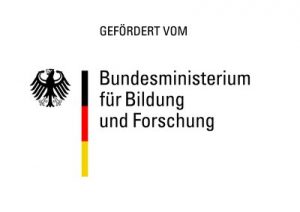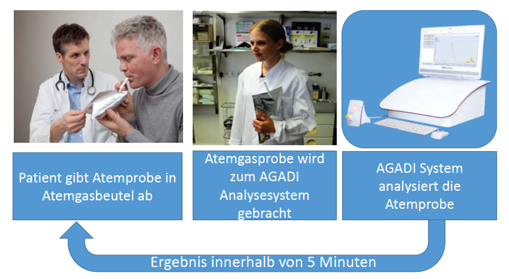Public projects
AGADI
Breathing gas analyzer for early cancer diagnosis
Light for the life sciences
Modern industrialized societies will face a series of challenges in the future. These include, among others securing affordable health care and securing livelihoods. The increase of widespread diseases due to demographic change and increasing environmental impact as a result of industrial growth requires the development of new methods and procedures to solve these problems. As has been shown, solutions based on photonic methods are particularly well-suited for quickly and flexibly capturing health and environmental data.
These photonic methods are therefore already the basis for innovative measuring methods in the fields of medicine, environmental analysis, biotechnology and food control in many areas. However, many of these methods are limited to stationary use.
In order to change this, this funding initiative aims to support the further development of these procedures towards on-site system solutions. These systems must be mobile and, ideally, miniaturized, e.g. be used in emergency medicine, in hospitals, medical practices and in the homecare sector. Likewise, these properties are indispensable for systems with which e.g. achieve the nationwide detection of pollutants in air, drinking water and wastewater as well as in soil and food.
The joint project AGADI
In the multidisciplinary AGADI project, a breathing gas diagnostic device based on optoacoustic technology will be implemented and evaluated, which can be used for “on-site analysis” in medical facilities, such as hospitals and medical practices. The system aims to enable non-invasive lung cancer diagnosis within a few minutes at an early, potentially curative stage.
Advantages of the joint project
Advantage for the patient: The early differentiated diagnosis of lung cancer makes it possible to use other therapeutic strategies that are curatively intended than currently possible. With today’s detection methods, a lung tumor is rarely diagnosed so early that it is operable and thus curable, as lung tumors on the one hand cause only a few complaints over a long time and on the other small changes in the lungs are often not recognizable by imaging diagnosis. Therefore, a suspicion-oriented early diagnosis by means of a fast and non-invasive procedure is a way to detect initial tumor stages, to pursue curative therapeutic approaches and thus significantly increase the life expectancy for the patients.
Time advantage: The time for the creation of the diagnosis is significantly shortened, thus reducing the tormenting uncertainty for patients suspected of having a tumor. The time span between initial visit to the doctor due to complaints and malignant diagnosis is today often 2 weeks (X-ray appointment, CT appointment, bronchoscopy appointment, histological work-up). With the AGADI breathing gas diagnostic unit, a diagnosis can be made within a few minutes.
Cost advantage: Logistically, currently used radiological imaging requires expert knowledge of radiologists, which is available on an outpatient basis only to a limited extent. Patients can not be examined directly in the practice of the caring family doctor / pulmonologist, but must usually have the imaging performed at another center. In addition to delays in scheduling and reporting and the significantly higher cost of radiological methods, the use of multiple physicians also requires greater financial resources than an ambulatory breathing gas diagnostic device
decentralized in a practice is used.
The collaborative project partners
The interdisciplinary cooperation between the individual partners makes this project possible. The company HLS Hypertech Laser Systems brings its knowledge in the field of gas analysis by means of opto-acoustic measuring technology into the project, the company Hassa their long-standing and special know-how for precision cuvette construction. The scientific and technical expertise is ensured by the Medical Laser Center Lübeck and the medical through a close cooperation with the Research Center Borstel.
The goal
The breathing gas diagnostic device AGADI is to be realized as a functional model. In collaboration with the Borstel Research Center, AGADI will initially be evaluated in healthy subjects, suspected lung cancer patients and confirmed lung cancer cases in a clinical study to determine the sensitivity and specificity, ie the false-negative and false-positive diagnoses. After successful completion of the project within the next few years min. 15 new, high-quality jobs created at the partners, as well as long-term annual sales of 10 times the amount of funding expected. The chances of recovery and the lifetime of many sufferers can be significantly increased, health care can save up to € 730 million a year, and Germany’s medical technology location can be strengthened in the long term.


